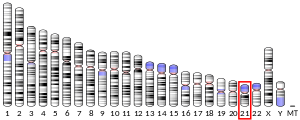PDXK
Piridoksal-kinaza jest enzim koji je kod ljudi kodiran genom PDXK sa hromosoma 21.[5][6]
Aminokiselinska sekvenca
urediDužina polipeptidnog lanca je 312 aminokiselina, a molekulska težina 35.102 Da.[6]
| 10 | 20 | 30 | 40 | 50 | ||||
|---|---|---|---|---|---|---|---|---|
| MEEECRVLSI | QSHVIRGYVG | NRAATFPLQV | LGFEIDAVNS | VQFSNHTGYA | ||||
| HWKGQVLNSD | ELQELYEGLR | LNNMNKYDYV | LTGYTRDKSF | LAMVVDIVQE | ||||
| LKQQNPRLVY | VCDPVLGDKW | DGEGSMYVPE | DLLPVYKEKV | VPLADIITPN | ||||
| QFEAELLSGR | KIHSQEEALR | VMDMLHSMGP | DTVVITSSDL | PSPQGSNYLI | ||||
| VLGSQRRRNP | AGSVVMERIR | MDIRKVDAVF | VGTGDLFAAM | LLAWTHKHPN | ||||
| NLKVACEKTV | STLHHVLQRT | IQCAKAQAGE | GVRPSPMQLE | LRMVQSKRDI | ||||
| EDPEIVVQAT | VL |
Funkcija
urediProtein kodiran ovim genom fosforilira vitamin B6, korak potreban za konverziju vitamina B6 u piridoksal-5-fosfat, važan kofaktor u posrednom metabolizmu. Kodirani protein je citoplazmatski] i vjerovatno djeluje kao homodimer. Opisane su alternativno prerađene varijante transkripta, ali njihova biološka valjanost nije utvrđena.[6]
Reference
uredi- ^ a b c GRCh38: Ensembl release 89: ENSG00000160209 - Ensembl, maj 2017
- ^ a b c GRCm38: Ensembl release 89: ENSMUSG00000032788 - Ensembl, maj 2017
- ^ "Human PubMed Reference:". National Center for Biotechnology Information, U.S. National Library of Medicine.
- ^ "Mouse PubMed Reference:". National Center for Biotechnology Information, U.S. National Library of Medicine.
- ^ Hanna MC, Turner AJ, Kirkness EF (May 1997). "Human pyridoxal kinase. cDNA cloning, expression, and modulation by ligands of the benzodiazepine receptor". J Biol Chem. 272 (16): 10756–60. doi:10.1074/jbc.272.16.10756. PMID 9099727.
- ^ a b c "Entrez Gene: PDXK pyridoxal (pyridoxine, vitamin B6) kinase".
Dopunska literatura
uredi- Chern CJ, Beutler E (1976). "Biochemical and electrophoretic studies of erythrocyte pyridoxine kinase in white and black Americans". Am. J. Hum. Genet. 28 (1): 9–17. PMC 1684914. PMID 2009.
- Merrill AH, Henderson JM, Wang E, et al. (1984). "Metabolism of vitamin B-6 by human liver". J. Nutr. 114 (9): 1664–74. doi:10.1093/jn/114.9.1664. PMID 6088736.
- Maruyama K, Sugano S (1994). "Oligo-capping: a simple method to replace the cap structure of eukaryotic mRNAs with oligoribonucleotides". Gene. 138 (1–2): 171–4. doi:10.1016/0378-1119(94)90802-8. PMID 8125298.
- Zhang Z, Smith E, Surowiec SM, et al. (1993). "Synthesis of N-(4'-pyridoxyl)sphingosine and its uptake and metabolism by isolated cells". Membrane Biochemistry. 10 (1): 53–9. doi:10.3109/09687689309150252. PMID 8510562.
- Lainé-Cessac P, Cailleux A, Allain P (1997). "Mechanisms of the inhibition of human erythrocyte pyridoxal kinase by drugs". Biochem. Pharmacol. 54 (8): 863–70. doi:10.1016/S0006-2952(97)00252-9. PMID 9354586.
- Suzuki Y, Yoshitomo-Nakagawa K, Maruyama K, et al. (1997). "Construction and characterization of a full length-enriched and a 5'-end-enriched cDNA library". Gene. 200 (1–2): 149–56. doi:10.1016/S0378-1119(97)00411-3. PMID 9373149.
- Hattori M, Fujiyama A, Taylor TD, et al. (2000). "The DNA sequence of human chromosome 21". Nature. 405 (6784): 311–9. Bibcode:2000Natur.405..311H. doi:10.1038/35012518. PMID 10830953.
- Lee HS, Moon BJ, Choi SY, Kwon OS (2001). "Human pyridoxal kinase: overexpression and properties of the recombinant enzyme". Mol. Cells. 10 (4): 452–9. PMID 10987144.
- Strausberg RL, Feingold EA, Grouse LH, et al. (2003). "Generation and initial analysis of more than 15,000 full-length human and mouse cDNA sequences". Proc. Natl. Acad. Sci. U.S.A. 99 (26): 16899–903. doi:10.1073/pnas.242603899. PMC 139241. PMID 12477932.
- Ota T, Suzuki Y, Nishikawa T, et al. (2004). "Complete sequencing and characterization of 21,243 full-length human cDNAs". Nat. Genet. 36 (1): 40–5. doi:10.1038/ng1285. PMID 14702039.
- Shin JH, Weitzdoerfer R, Fountoulakis M, Lubec G (2004). "Expression of cystathionine beta-synthase, pyridoxal kinase, and ES1 protein homolog (mitochondrial precursor) in fetal Down syndrome brain". Neurochem. Int. 45 (1): 73–9. doi:10.1016/j.neuint.2003.12.004. PMID 15082224. S2CID 20620865.
- Fang X, Zhou ZM, Lu L, et al. (2004). "Expression of a novel pyridoxal kinase mRNA splice variant, PKH-T, in human testis". Asian J. Androl. 6 (2): 83–91. PMID 15154080.
- Gerhard DS, Wagner L, Feingold EA, et al. (2004). "The Status, Quality, and Expansion of the NIH Full-Length cDNA Project: The Mammalian Gene Collection (MGC)". Genome Res. 14 (10B): 2121–7. doi:10.1101/gr.2596504. PMC 528928. PMID 15489334.
- Wang L, Zhu YF, Guo XJ, et al. (2006). "A two-dimensional electrophoresis reference map of human ovary". J. Mol. Med. 83 (10): 812–21. doi:10.1007/s00109-005-0676-y. PMID 16021519. S2CID 6644433.
- Kimura K, Wakamatsu A, Suzuki Y, et al. (2006). "Diversification of transcriptional modulation: Large-scale identification and characterization of putative alternative promoters of human genes". Genome Res. 16 (1): 55–65. doi:10.1101/gr.4039406. PMC 1356129. PMID 16344560.
- Flanagan JM, Beutler E (2006). "The genetic basis of human erythrocyte pyridoxal kinase activity variation". Haematologica. 91 (6): 801–4. PMID 16704963.
- Hu YH, Warnatz HJ, Vanhecke D, et al. (2006). "Cell array-based intracellular localization screening reveals novel functional features of human chromosome 21 proteins". BMC Genomics. 7: 155. doi:10.1186/1471-2164-7-155. PMC 1526728. PMID 16780588.
- Musayev FN, di Salvo ML, Ko TP, et al. (2007). "Crystal Structure of human pyridoxal kinase: Structural basis of M+ and M2+ activation". Protein Sci. 16 (10): 2184–94. doi:10.1110/ps.073022107. PMC 2204131. PMID 17766369.







